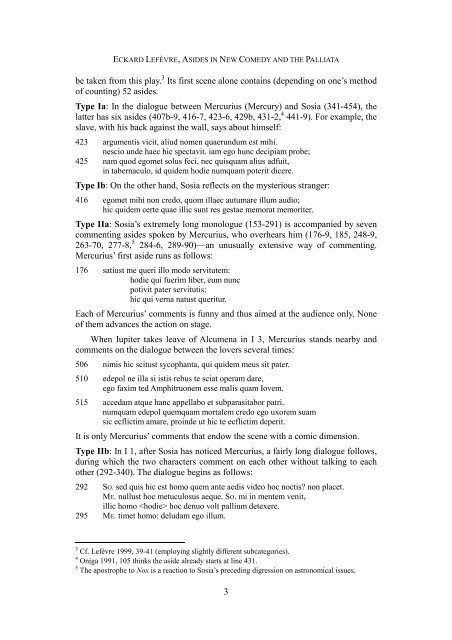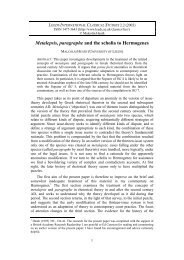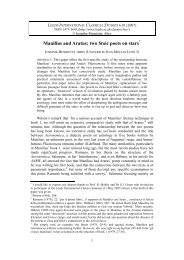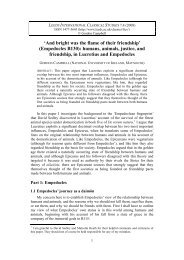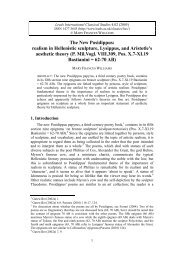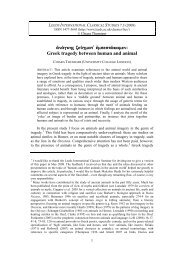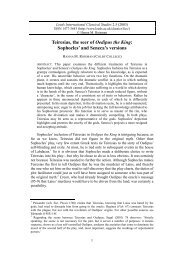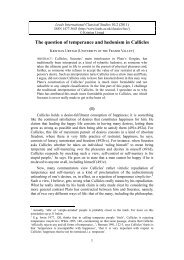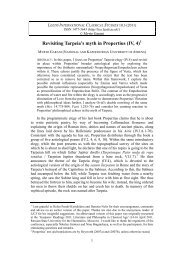Asides in New Comedy and the Palliata - Leeds International ...
Asides in New Comedy and the Palliata - Leeds International ...
Asides in New Comedy and the Palliata - Leeds International ...
You also want an ePaper? Increase the reach of your titles
YUMPU automatically turns print PDFs into web optimized ePapers that Google loves.
ECKARD LEFÈVRE, ASIDES IN NEW COMEDY AND THE PALLIATA<br />
be taken from this play. 3 Its first scene alone conta<strong>in</strong>s (depend<strong>in</strong>g on one’s method<br />
of count<strong>in</strong>g) 52 asides.<br />
Type Ia: In <strong>the</strong> dialogue between Mercurius (Mercury) <strong>and</strong> Sosia (341-454), <strong>the</strong><br />
latter has six asides (407b-9, 416-7, 423-6, 429b, 431-2, 4 441-9). For example, <strong>the</strong><br />
slave, with his back aga<strong>in</strong>st <strong>the</strong> wall, says about himself:<br />
423 argumentis vicit, aliud nomen quaerundum est mihi.<br />
nescio unde haec hic spectavit. iam ego hunc decipiam probe;<br />
425 nam quod egomet solus feci, nec quisquam alius adfuit,<br />
<strong>in</strong> tabernaculo, id quidem hodie numquam poterit dicere.<br />
Type Ib: On <strong>the</strong> o<strong>the</strong>r h<strong>and</strong>, Sosia reflects on <strong>the</strong> mysterious stranger:<br />
416 egomet mihi non credo, quom illaec autumare illum audio;<br />
hic quidem certe quae illic sunt res gestae memorat memoriter.<br />
Type IIa: Sosia’s extremely long monologue (153-291) is accompanied by seven<br />
comment<strong>in</strong>g asides spoken by Mercurius, who overhears him (176-9, 185, 248-9,<br />
263-70, 277-8, 5 284-6, 289-90)—an unusually extensive way of comment<strong>in</strong>g.<br />
Mercurius’ first aside runs as follows:<br />
176 satiust me queri illo modo servitutem:<br />
hodie qui fuerim liber, eum nunc<br />
potivit pater servitutis;<br />
hic qui verna natust queritur.<br />
Each of Mercurius’ comments is funny <strong>and</strong> thus aimed at <strong>the</strong> audience only. None<br />
of <strong>the</strong>m advances <strong>the</strong> action on stage.<br />
When Iupiter takes leave of Alcumena <strong>in</strong> I 3, Mercurius st<strong>and</strong>s nearby <strong>and</strong><br />
comments on <strong>the</strong> dialogue between <strong>the</strong> lovers several times:<br />
506 nimis hic scitust sycophanta, qui quidem meus sit pater.<br />
510 edepol ne illa si istis rebus te sciat operam dare,<br />
ego faxim ted Amphitruonem esse malis quam Iovem.<br />
515 accedam atque hanc appellabo et subparasitabor patri.<br />
numquam edepol quemquam mortalem credo ego uxorem suam<br />
sic ecflictim amare, pro<strong>in</strong>de ut hic te ecflictim deperit.<br />
It is only Mercurius’ comments that endow <strong>the</strong> scene with a comic dimension.<br />
Type IIb: In I 1, after Sosia has noticed Mercurius, a fairly long dialogue follows,<br />
dur<strong>in</strong>g which <strong>the</strong> two characters comment on each o<strong>the</strong>r without talk<strong>in</strong>g to each<br />
o<strong>the</strong>r (292-340). The dialogue beg<strong>in</strong>s as follows:<br />
292 SO. sed quis hic est homo quem ante aedis video hoc noctis? non placet.<br />
ME. nullust hoc metuculosus aeque. SO. mi <strong>in</strong> mentem venit,<br />
illic homo hoc denuo volt pallium detexere.<br />
295 ME. timet homo: deludam ego illum.<br />
3 Cf. Lefèvre 1999, 39-41 (employ<strong>in</strong>g slightly different subcategories).<br />
4 Oniga 1991, 105 th<strong>in</strong>ks <strong>the</strong> aside already starts at l<strong>in</strong>e 431.<br />
5 The apostrophe to Nox is a reaction to Sosia’s preced<strong>in</strong>g digression on astronomical issues.<br />
3


